Reports
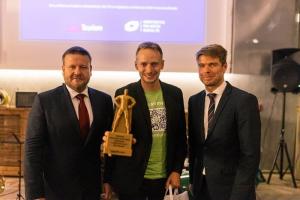
Based on the votes of experts and the general public, the Czech start-up of CTU graduates SmartGuide won the Hero of Tourism 2022 award, a special award from the Minister of Regional Development and the CzechTourism Director's Award in the Digitalization category.

The Japanese Ambassador Hideo Suzuki invited scientists and experts in quantum communication together with representatives of the Czech government for a dinner on the occasion of the visit of Prof. Akiro Furusawa from the University of Tokyo in Prague. One of the guests at the Japanese residence was Prof. Igor Jex from the Department of Physics of the Faculty of Nuclear Sciences and Physical Engineering of the Czech Technical University in Prague (FJFI).
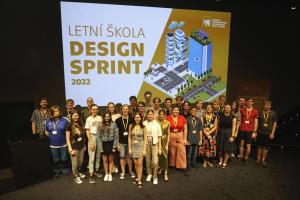
The city and sustainable development was the theme of the Design Sprint Summer School. Over 20 students, led by faculty mentors, looked for solutions to use modern technology to make cities better and more environmentally friendly places to live. In just 5 days, they learned the Design Sprint method developed by Google, through which they designed their own projects for a better and more sustainable city life. The summer school was hosted by the Faculty of Information Technology of the Czech Technical University in Prague (FIT CTU) on 25-29 July 2022.
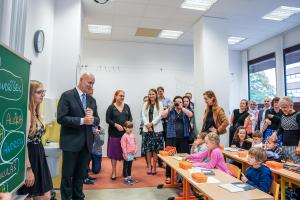
The University Primary School Lvíčata (Lion cubs), established by the CTU in Prague, welcomed almost twenty first-year pupils today. Some of them already have experience with Lvíčata, as they come from the kindergarten by the same name, located around the corner from the primary school. The pupils were greeted by the Rector of the CTU Vojtěch Petráček and the Chancellor Lucie Orgoníková.

The industry can significantly help the czech army with the introduction and use of new technologies based primarily on artificial intelligence. There are still many major companies that do not cooperate with the Army. That is why academics met today at the Czech Technical University in Prague with representatives of the government, the army and the private sector.
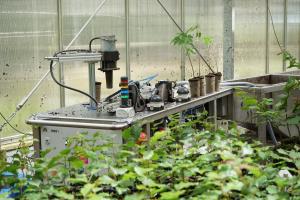
Caring for orchards and forests requires a lot of mostly manual work. That's the way it's been and probably always will be, and that's fine. After all, orchards and forests deserve the best personal care. But behind that is hard work, where both nature and skilled human hands can sometimes use some technical help.
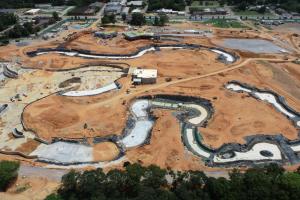
The Montgomery Whitewater Park in Alabama, USA, will cover 50 hectares and feature two wild water canals. The shorter one, 380 metres long, meets Olympic standards, while the longer recreational one is over 500 metres long. The hydraulic design of the canals and their hydraulic optimization were solved by experts from the Faculty of Civil Engineering of the Czech Technical University in Prague on a scale model of both canals, which were created at the Water Management Experimental Centre of the Faculty of Civil Engineering.
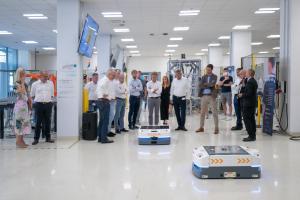
2022/08/22
Last week, a regular meeting focused on the strategic topics of digitalisation in ŠKODA AUTO Production and Logistics took place at the Czech Institute of Informatics, Robotics and Cybernetics at the Czech Technical University in Prague (CIIRC CTU). On this occasion, members of the ŠKODA AUTO Board of Directors, Dr. Michael Oeljeklaus and Christian Schenk, together with forty experts from the fields of production and logistics, quality management, finance and IT, were introduced to selected projects that are currently underway at the CIIRC CTU and are related to the automotive industry. During a two-hour tour of the Testbed for Industry 4.0, the scientific teams presented them with concrete research results using the latest technologies available at the RICAIP Centre of Excellence.

2022/08/22
Although the Czech Republic has neither a spaceport nor a sea, it has been among the world leaders in simulating space missions for three years now.
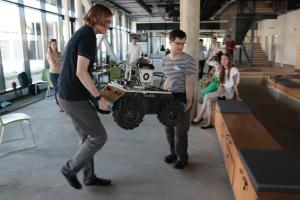
As part of the V4 defence cooperation, the autonomous robot of the CTU FEL was presented in Hungary.
2022/08/22
In the first half of June, the V4 Innovation Challenge Day took place at the Innovation Centre of the University of Debrecen, Hungary, with the subtitle Military Autonomous Systems. Thanks to the initiative of the Ministry of Defence, the Czech Republic was represented by a team from the Faculty of Electrical Engineering, which presented its wheeled robot with an autonomous navigation system.